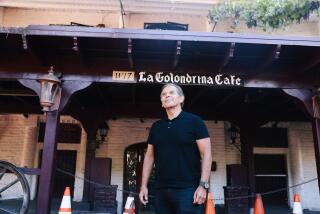Cuban Couple Pays High Price as Enthusiasm for Communism Wanes
HAVANA — For forty-something academics Nestor and Violeta Castellanos, it’s been a long and agonizing transition from devoted communists to outcast dissidents.
“We’re of the generation of young people who emerged with the revolution,” Nestor says. “We were the idealist youth of the ‘60s.”
A 42-year-old physicist, he smoked a chain of Cuba’s strong, poorly packed cigarettes as he and his wife, 41, a literature and art history professor, spoke to visitors in their tiny Havana apartment.
The walls were crammed with books, students’ paintings and the mementos of their many years serving the revolutionary cause: painted spoons from the Soviet Union, carvings and handicrafts from Angola and Vietnam.
Like many other Cubans their age, wide-eyed schoolchildren when Fidel Castro toppled the corrupt dictatorship of Fulgencio Batista in 1959, their political outlook was forged by participation in the Castro regime’s communist youth league and later in the party itself.
They enthusiastically backed Castro’s effort to improve education, health services and living standards through strict, paternalistic state control of society and the distribution of resources. They cheered his bold defiance of the Yankee Goliath to the north, and his alliance with the Soviet Union.
And they eagerly joined in internationalist adventures, supporting sympathetic causes elsewhere in the Third World.
For the Castellanos, however, experience sowed doubt.
Few Cubans have publicly called for change, and many still voice support for the government’s policies. But this couple’s case reflects what the small dissident community contends is spreading disillusion.
Nestor said he began to see the revolution through new eyes during his 18 months as a civilian volunteer in Angola in 1981 and 1982. He refuses to be specific about what upset him in the African nation, where he sometimes took up arms when the long civil war there flashed in his district.
“It’s still too painful,” he said. “Let’s just say I returned embittered.”
About 400,000 Cubans passed through Angola, and Communist Party stalwarts are fond of saying there were just two defections. But according to Nestor, “all of us who were there came back with our outlook a little changed.”
A wave of harsh political repression coinciding with the Mariel boatlift of Cuban refugees to the United States planted another seed of doubt, he said.
Then came the U.S. invasion of Grenada in 1983, a watershed for Violeta. Her brother, a doctor, was among more than 600 Cuban volunteers helping the Marxist government there.
During the invasion, Cuba’s state-controlled media reported that all volunteers in Grenada died in heroic combat with the Americans. Violeta was “nearly hysterical” over her brother’s supposed death, and then shocked to discover it was groundless propaganda: only 24 of the Cubans were killed.
“I never thought they would lie to us like that,” she said.
When the captured Cubans eventually were returned by the United States, Castro praised them publicly. But soon thereafter, “they were summoned by the armed forces, and cashiered. Those that were party members lost their membership,” Violeta said.
“They became pariahs . . . for not having been killed.”
Perestroika further loosened the couple’s dedication to the cause, as magazines arrived from Moscow espousing a more democratic form of socialism. Castro banned the magazines in 1988, but not before their influence was felt among Cuban intellectuals.
“It was a difficult, slow and painful evolution,” Castellanos said. “We had a lot of faith in what we believed.”
When the Soviet Bloc’s collapse plunged the country into economic crisis and strict rationing was implemented, the Castellanos say they were appalled to see that some Cubans with high party connections weren’t suffering as much as their countrymen.
The government acknowledges a small degree of official corruption, but it insists that offenders are severely punished when caught.
A professor at the University of Havana, where he had taught for 22 years, Nestor began promoting a declaration that criticized the Cuban party’s inflexibility and suggested Western-style democratic reforms. Made public in December 1991, it carried 15 professors’ signatures, including his.
Over the next two months, its supporters were expelled from the party and their jobs. They were barred from teaching anywhere else.
In line with the government’s policy of full employment, “one physics professor was offered work as an apprentice in a textile factory,” Castellanos said. With no other means of support, “she had no alternative.”
Violeta also taught for years at the University of Havana, but was pressured into giving up the teaching post in 1990. She came under criticism for failing to spend more time in party activities, such as volunteer construction and farming brigades.
“My principal concern was providing good classes to my students,” she said.
She took a new job teaching Italian in a prominent language school--until her husband’s official disgrace.
Following a party grilling in March, she was found guilty of counterrevolutionary attitudes and stripped of party membership. When she called a news conference to protest the judgment, it was upped to treason, her husband said, a charge that leaves her subject to criminal prosecution at any time.
Like her husband, she was then banned from teaching.
Making the family’s outcast status complete, the couple’s son, a 21-year-old university student, was booted out of the party’s youth league. His parents say he was asked to publicly denounce them but refused.
In July, Nestor’s group issued another declaration, coinciding with Castro’s presence at an Ibero-American summit in Spain and calling again for political reform.
That prompted a summons to the local police station, where Nestor said he was threatened with arrest and imprisonment.
Party organizations in the neighborhood also called the Castellanos in for a scolding, and to warn them of retaliation if they persisted in counterrevolutionary activities. They were told to give no more interviews to “the enemy press.”
Nestor tries to be stoic. “We have assumed the risks of our attitude,” he said. “But I can’t say we sleep well. We sleep in fear.”
The Castellanos refuse to take other jobs, insisting on their right to practice their profession. But “our actions carry a consequence--we have no money,” Nestor said.
Both are thin, and growing thinner each day. They try to survive on the government ration book each Cuban receives and their meager savings, which may last three, perhaps four more months. With government agents watching them, they don’t dare resort to the black market where many Cubans meet their needs.
While the government contends that many dissidents are simply seeking a one-way visa out of Cuba, the Castellanos say they want to stay.
“Our wish is to change the country’s situation, not our personal situation,” Nestor said. “Our whole family is in Cuba. We are Cubans.”
But he conceded that it may beyond his control.
“In three months, our personal situation may be critical,” he said.
More to Read
Sign up for Essential California
The most important California stories and recommendations in your inbox every morning.
You may occasionally receive promotional content from the Los Angeles Times.










